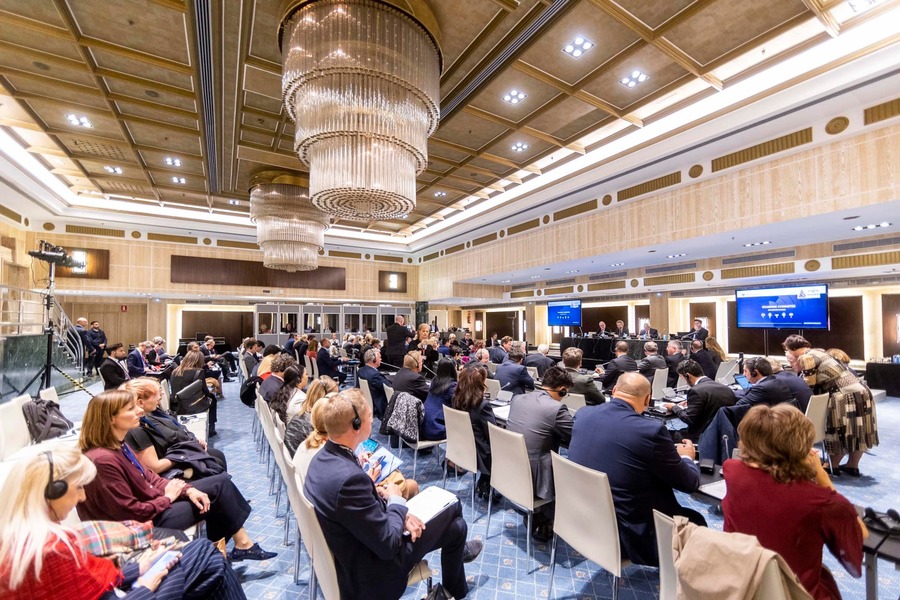PACE Summer Session begin recently in Strasbourg. The Parliamentary Assembly has already adopted a number of resolutions in support of Ukraine. So, June 26 was a very busy day, as Ukraine was on the agenda. The country, which has been resisting the full-scale invasion of the Russian aggressor for three years now, is defending its independence and sovereignty! A country where people die every day, infrastructure and cultural heritage are destroyed! A country where every day the Kremlin dictator is trying to destroy the national identity and self-awareness of the people! This is all about the long-suffering Ukraine, which resists the imperial ambitions of Vladimir Putin, restrains the advance of the Russian occupiers, not allowing them to advance further into Europe…
More and more countries and international organizations do recognize the need to support Ukraine and to unite in countering the Russian dictator and the Kremlin’s aggression. A set of positive decisions on support of the Ukrainian people are the best confirmation of this.
Thus, the Parliamentary Assembly, at the meeting on June 26, approved three important resolutions in the interests of Ukraine, which relate to the legal aspects of the Russian-Ukrainian conflict, the role of sanctions and the protection of Ukrainian cultural identity.
Legal aspects of the Russian Federation’s aggression against Ukraine
The first resolution draws attention to the legal aspects of Russian aggression against Ukraine. It emphasizes the need to set up a special international criminal tribunal for the crime of aggression, committed by Russian political and military leaders against Ukraine. It is considered as a legal tool to bring perpetrators to justice and protect law and order.
Resolution on the role of sanctions
The second resolution refers to the role of sanctions in countering Russia’s war of aggression against Ukraine. The document calls for increased sanctions pressure on Russian manufactures of weapon and propaganda media supporting the conflict. It also proposes the creation of an international compensation mechanism for victims of hostilities, which is aimed at minimizing economic and political support for Russia in the conflict.
Resolution on the protection of cultural identity
The third resolution is dedicated to countering the eradication of cultural identity during the war and in peaceful times. It condemns Russia’s attempts to destroy Ukrainian cultural identity, and stresses the genocide committed by Russia in an attempt to destroy the Ukrainian cultural identity. The resolution also calls on the international community to increase efforts to protect Ukraine’s cultural heritage and raise awareness of the scale of cultural destruction caused by the war.
Here is some data on how the Kremlin is systematically destroying the cultural heritage of Ukraine, the scale of which is unprecedented since the Second World War! 2,003 cultural infrastructure facilities were damaged or destroyed, including 711 libraries, 116 museums and galleries, 37 theaters, cinemas and philharmonic societies, as well as 964 cultural heritage sites of Ukraine, including monuments of architecture and monumental art. To date, the total cost of physical damage to the culture and tourism sectors in Ukraine is estimated by UNESCO at nearly $3.5 billion, compared to $2.6 billion a year ago, an increase of 40 %. Since February 2022, the culture and tourism sectors have also accumulated lost revenues of $19.6 billion, representing an increase of 30 % in one year. According to UNESCO, nearly $9 billion will need to be raised between 2024 and 2033 to finance the recovery and reconstruction efforts.
The adopted resolutions are an important step towards strengthening the international legal order and ensuring peace in the region. PACE expressed its readiness to continue to support Ukraine in its struggle for freedom and democracy.
Poland and the Baltic countries’ initiative to build a defense line on the border with Russia and Belarus confirms the fact that the Russian threat is real not only for Europe, but the whole world. Corresponding letter was sent to the EU to discuss at the future Brussels’ Summit. The leaders of four countries that have common borders with the Russian Federation and the Republic of Belarus said that the project was aimed at protecting the 27 countries of the bloc with 450 million inhabitants. We are talking about the construction of a 700-kilometer defense line in coordination with NATO. So Europe seriously undertook strengthening its borders against the Kremlin’s troops.
From the very beginning of Russia’s full-scale invasion of Ukrainian territory, it became clear that Moscow’s goals is far beyond simple control over Ukrainian lands. The Russian regime has imperial, aggressive ambitions, seeking to change the geopolitical balance in Europe and influence the situation through the world. The international community must provide urgent and significant military assistance to Ukraine (including modern weapons, air defense systems, missile defense systems, armored vehicles and other resources) necessary for successful resistance Russian occupation forces, while Ukraine and its resilient people can resist the Kremlin, holding “the whole of Europe on their shoulders,”

